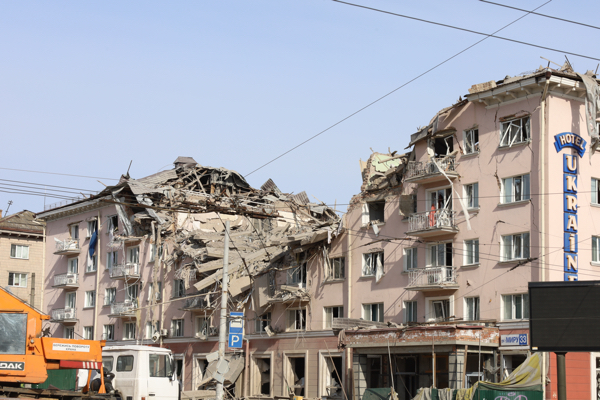Just when hoteliers in Eastern European countries like Poland, the Czech Republic and Slovakia were looking forward to post-pandemic recovery, Russia’s invasion of Ukraine has come up as a fresh challenge with international visitation numbers dropping precipitously.
Hoteliers in Poland, which has been getting the highest influx of Ukrainians since the war started, have been witnessing almost a 100% cancelation of bookings by international travelers, especially from the United States.
But even as the war rages on in Ukraine, some studies show hotel performance has remained stable in many parts of Europe with countries bordering Ukraine seeing a refugee-driven lift in occupancy.

Data from STR released on May 1 showed that as of 11 April, the U.K.’s running 28-day occupancy was 87% of the comparable 2019 level, and the country’s index has consistently been above 80 since February 23. Poland (84.5) and Ireland (81.3) realized the next-highest occupancy indexes, but despite having the second-highest occupancy index, Poland’s levels have fallen over recent weeks after hitting an index peak of 94 on March 29.
Data from the previous month released by STR in late March showed Northern Europe has stayed furthest ahead in absolute occupancy and indexed levels to 2019.
But, again, hoteliers are being hurt by a lack of international business. According to a March 8 survey by Canadian travel agency app Hopper, flight search demand from the U.S. to Europe grew after the decline in Omicron cases but demand began to dip towards the end of February. Since February 24, searches of round-trip flights from the U.S. to Europe were down an average of 9% below expected levels. The impact was neither seasonal, nor was it seen for flights to other European regions, signaling Americans’ fear of traveling to Europe. Since February 12, there has been a shift away from Europe to destinations like Mexico, Central America and the Caribbean, while Europe dropped from 21% to 15% of international bookings.
“Before February 24, pandemic restrictions and ongoing geopolitical tensions had significantly shrunk the Western European/North American commercial transient business, which was once the raison d’être for commercial city hotels, especially in Moscow. The war will all but eliminate this segment for a long time to come,” said Darren Blanchard, a Moscow-based hotel operations development veteran who worked for several global operators and independent hotels between 1992 and 2021.

The hotel clientele that defines unsettled or early settling markets, like media, NGOs and Western diplomats, constituted the bulk of the hotel occupancy in hotels in Moscow since 1992, Blanchard explains. With sanctions in place and international media withdrawing their personnel from Russian cities, it seems unlikely for Russian hotels to rebound fully.
Hotels that once had American or European segments as the backbone of their business will suffer unless they can replace them with domestic and Asian business, Blanchard said.
Nonetheless, since the war and the difficulties of Russians traveling outside the country, room rates in resort markets like Sochi have continued to rise. For example, single night, single occupancy rates listed on Monday for the Swissôtel Resort Sochi Kamelia were at €500, Blanchard noted.
Impact on Ukraine
Understandably, the impact of the war is the greatest for Ukraine’s hospitality industry. While most upscale and major brands have suspended operations, many hotels are open to provide temporary shelter for internal refugees fleeing from the Northern parts of the country and accommodating journalists, volunteers and members of international missions. Likening the situation in Ukraine to a devastating hurricane, PKF hospitality group’s Managing Director, Head of Ukraine and Belarus, Sergii Khorkhulov said about 10.7 million Ukrainians have become internally displaced persons.
“In the territories where the hostilities took place or are taking place, tourist and hotel businesses have been completely demolished. In some regions, such as Kharkiv, Sumy, Chernihiv, Luhansk, Donetsk and Azov, hotel infrastructure will need to be built from scratch. They say that at least 60,000 employees from eastern Ukraine have lost their jobs in HORECA sector,” Khorkhulov said.

Ironically, during the first few weeks since the war broke out, occupancy in hotels in western Ukraine was up 300%, but migrating Ukrainians reportedly were not being charged for their stays. As Russia started advancing from the north and east, Ukrainians had to move out of their homes and shift to the west, closer to other friendly European countries, creating a massive demand for hotels while people were in transit. Hotels found a way to accommodate more people than their capacity by setting up extra beds in corridors, conference and meeting rooms and any other vacant spaces, explained Iryna Sidletska, president of the Ukrainian Hotel & Resort Association.
While hotels in the eastern regions have either been destroyed or are deemed unsafe, resulting in extremely low occupancy, bookings in cities like Kyiv and Odessa are often made within a day or even a five- to six-hour window. Guests stay at the hotels for around two to three days and then either move to the west or to other European countries. Besides internal refugees, hotels are also being booked by corporate clients, people who have been forced to shift their offices from the east to the safer western parts of the country, Sidletska said.
There are very few upscale hotels open in Kyiv, with only a Premier Hotels and Resorts-branded property still serving guests, said Valeria Sekisova, director sales and marketing, Premier Hotels and Resorts. “As a result, our hotel has more than 200% growth in occupancy to the same period last month. Our hotel in Lviv (in Western Ukraine) has been working with almost 100% occupancy for the last months. But the situation with our 3-star hotels in Kyiv and hotels in other regions of Ukraine is not so optimistic. They have lost almost all business.”

While occupancy in hotels across Western Ukraine is 85%, the situation is entirely different in Kyiv, eastern and southern Ukraine, Sidletska added. “Hotels in these parts are mostly closed because of the military situation, constant shelling and risk of invasion,” she said. “In average, for overall Ukraine, occupancy is 32%. But the statistics may or may not be entirely relevant as many hotels, especially the major global brands, have not provided or have been unable to provide information to data analysis organizations since February 24.”
By the end of April, Sidletska anticipated occupancy to be around 85% in Western Ukraine, 5% in the south, nil in the east and approximately 17% too 20% in Kyiv, adding that major hotel brands like Hilton, InterContinental, Fairmont, ibis and Radisson have closed their properties in Kyiv.
Currently, Lviv is perhaps the only city with some semblance of normalcy, said Ivan Loun, international relations officer, UHRA. “Since logistics are routed from Poland, Romania and Slovakia, Lviv has the highest occupancy right now. There are a lot of volunteers who stay here to help with rescue and relief work along with journalists and corporate clients mostly engaged in retail, banks and pharmacy sectors,” he said.
Restructuring operations
Hotels have restructured operations to manage the large number of guests and maximize the handful of staff that are working.
Properties are no longer offering 5-star services as they are now functioning like sophisticated refugee camps, explained Loun. Only services that are considered as basic necessities are being provided and guests have been informed of the reduced number of services available. For guests who can afford to pay for their stay, prices have been reduced drastically. Services have been minimized to reflect prices, Loun added.
Sidlestska said that room service has been suspended, food and beverage menu options are limited, reception is not available round the clock, breakfast hours at the on-site restaurants have been changed to start a bit later and amenities like swimming pools are closed as they are expensive to maintain. Gyms are operating as there are no additional costs to keep them open, according to Sidlestska.
In the cities that are recovering from the war, like Kyiv and Odessa, hoteliers have been combining responsibilities of the minimal working staff. For example, the receptionist doubles up as the waitress and the security personnel is also working as the bellman.
Future of hotels in Ukraine
Although Ukraine continues to be in a state of war, things have begun to look up in some parts of the country. While there is zero leisure booking activity, there has also been a gradual return of residents to Kyiv. Corporate clients who were earlier forced to shift from Kyiv are also returning to the city and trying to resume work from their offices, helping to increase occupancy at the hotels and add to the hotels’ dwindling revenues.
A full recovery, however, will take time. With the widespread destruction, experts say it will take several years to rebuild infrastructure and recover lost business. In regions where active hostilities are taking place, it will take 10 to 15 years to restore tourist and hotel infrastructure, Khorkhulov suggested. “After the end of the active phase of hostilities, it will take at least two or three years for the tourism and hotel business to reach pre-war levels, and this applies only to those regions where there has been no military action and no bombing.”
Cannons are still roaring and the guns might not stop firing until end of summer, Loun said, adding occupancy in the eastern and western regions will improve only after summer.
Looking back, COVID feels less challenging than the prevailing situation, hoteliers said. The war forced them to restructure operations and ‘safety’ got an entirely new connotation and meaning.
“The best solution today will be to continue to do true hospitality, the best we can,” Sekisova said. “To make our hotels small islands of safety and service to all our guests, no matter if it is a member of an international diplomatic mission or a mother with a child who is a refugee who will stay for free.”
Today, hotels not only function as temporary shelters but also provide food to soldiers and paramilitary staff. In such a situation, employees have become ready to tackle additional roles and work extra hard.
“We are all working without being overly emotional about the prevailing situations,” Sidletska said. “We are taking fast decisions, prioritizing tasks and decisions that require our attention at that precise moment. We have stopped conducting large-scale meetings to discuss our plans beforehand. Many of us are working without having our families close by. My husband and daughter have moved to the west while I am here in Odessa. The situation is very new for all of us. In the absence of our loved ones, we are all working like a tightly knit, patriotic family at the hotels.”
2 comments
Comment
You must be logged in to post a comment.

Nils Heckscher
May 4, 2022 at 10:20 amOne can only applaud the outlook reported here by people in the midst of it all! There is a message of hope I see, one of not giving up and I find that enormously inspiring. Whilst it is sadly way too early, we all need to look at putting Ukraine on our must-visit destinations when it is safe to travel there. My heart goes out to my colleagues quoted here but also those countless others in our industry who keep working and looking after guests, be they paying or not! They are suffering a fate which hardly anyone can imagine and they deserve all the support we can muster.
Valeria Sekisova
May 5, 2022 at 1:10 amDear Nils,
Thank you for your support! Ukraine is a country of the open-heart hospitality and we will be happy to meet all our guests to our wonderful country. Now we will stay strong and do everything to have a possibility to welcome you to the free and beautiful Ukraine.